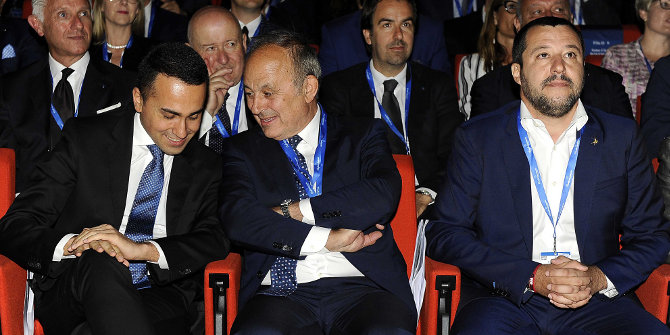 Emmanuel Macron’s La République En Marche (LREM) completed their victory of the French legislative elections on 18 June, although the size of the majority was not as large as had been predicted following the first round of voting a week earlier. Nick Parsons highlights that although Macron can now claim legitimacy to push forward with a number of ambitious reforms, his position may be weaker than it appears due to the high rate of abstentions in the election and potential opposition from within his own party.
Emmanuel Macron’s La République En Marche (LREM) completed their victory of the French legislative elections on 18 June, although the size of the majority was not as large as had been predicted following the first round of voting a week earlier. Nick Parsons highlights that although Macron can now claim legitimacy to push forward with a number of ambitious reforms, his position may be weaker than it appears due to the high rate of abstentions in the election and potential opposition from within his own party.

Macron stencil in Paris, Credit: Lorie Shaull (CC BY-SA 2.0)
After what has at times seemed like a marathon, the French electorate finally designated its new government on Sunday 18 June. This vote was the latest in a series stretching back to the primaries that chose François Fillon as the right-wing presidential candidate in November 2016. There then followed the left primaries in January and February 2017, the presidential elections in May and the first round of voting in the legislative elections on 11 June.
It is not surprising, then, that election fatigue appears to have hit the French people. In the second round of voting in the legislative elections, the abstention rate hit record levels, with 57.36% of the electorate not bothering to go to the polling booths. Of those that did, some 4.2% spoilt their ballot paper, meaning that only 38.4% of the electorate expressed a wish to see any of the candidates standing for election win a parliamentary seat.
The feeling that the election was a foregone conclusion may also explain the apparent indifference of the electorate for this election. Polls following the first round of voting predicted that Emmanuel Macron’s La République En Marche (LREM) party would clean up, winning over 400 of the 577 seats in the National Assembly. In the event, the victory was not a great as the polls predicted, but it was nonetheless crushing. In alliance with the centrist MoDem, Macron’s party, which did not even exist at the time of the left primaries at the start of 2017, won 350 seats with 49% of votes cast.
The main opposition will come from the mainstream right, which won 137 seats on a 27% vote share. The Socialist Party’s fall from grace was confirmed with just 7.5% of votes cast giving it 44 seats in alliance with other left formations – a sharp drop for a party that was in the majority with nearly 300 seats in the outgoing parliament. The Front National will also be disappointed after failing to capitalise on the 34% of votes that Marine Le Pen scored in the second round of the presidential elections. With 8.75% of the vote, the far-right party will have only eight seats in the new National Assembly, below the fifteen needed to from a parliamentary group. On the other hand, Jean-Luc Mélenchon’s La France insoumise will be pleased with its result. With nearly 5% of the vote it will have 17 seats, enough to form a parliamentary group without relying on the French Communist Party, which gained 10 seats on a 1.2% vote share.
Although not as large as previously predicted, Macon’s victory is, in terms of seats, is a landslide. He will have a majority of over 120, and so should be able to claim the democratic legitimacy to pursue his far-reaching reform agenda. However, as indicated above, his democratic mandate is not as strong as his parliamentary majority. The high abstention rate means that the LREM/MoDem majority actually has the backing of only 18.9% of the electorate. The real problem is that the opposition in France is even weaker. All other parties, with the exception of La France insoumise, will now go through a period of introspection as they face up to their own disappointing results that have seen LREM swept to power. As a parliamentary opposition, they will be non-existent and irrelevant.
This does not necessarily mean that Macron will have things all his own way. Firstly, as a new party, his formation has no representation in the French Senate, so may face some obstacles there when it comes to pushing legislation through. Secondly, as the Socialists found during Hollande’s presidency, opposition may come from within the governing majority’s own ranks. Many of those who have been elected under the LREM banner lack any previous experience of politics, particularly at the national parliamentary level. It is unknown how they will react to the requirements of party discipline as the wheeling and dealing of politics and the bowing to powerful interests leads to compromises, some, perhaps many, of which they will not like. Add to this the fact that LREM is a new, and therefore probably not yet stable, coalition of the centre-left and centre-right, and the size of the majority may mean that internal opposition is not easily controlled as it is seen as risk-free.
Finally, opposition may come from the streets. Among the first measures to be taken by Macron is a reform of the Labour Code that will bring in more decentralised bargaining and greater flexibility for employers in dealing with redundancy, and he has made it clear that he intends to legislate by decree on these issues in order to get them implemented quickly. Although he has already begun to consult trade unions on the issue, it does not appear that he will be persuaded by any counter-arguments they put forward. A large parliamentary majority will presumably give him even greater confidence to push through these reforms in the face of union opposition. One of the main unions, the CGT, has already announced opposition to his plans and a call for demonstrations appears increasingly likely. The early days of Macron’s presidency could thus be marked by the sort of conflict seen against Myriam El Khomri’s Labour Law, upon which Macron’s reforms build.
Of course, Macron can claim the legitimacy of his presidential victory, followed by nearly half of the votes cast in the latest parliamentary vote. He has achieved amazing results in a short space of time, winning the presidency and a thumping parliamentary majority when he did not even have a party as the electoral cycle kicked off seven months ago. It would therefore be foolhardy to bet against him pushing through far-reaching reforms and succeeding. However, he may need a more solid support base than the one he has, the weakness of which is masked by his huge majority. With only one in five voters backing him, things could quickly sour if his reform programme does not succeed.
Please read our comments policy before commenting.
Note: This article gives the views of the author, and not the position of EUROPP – European Politics and Policy, nor of the London School of Economics.
_________________________________
 Nick Parsons – Cardiff University
Nick Parsons – Cardiff University
Nick Parsons is Reader in French in the School of Modern Languages, Cardiff University, and is a specialist in French and European industrial relations and social policy.





1 Comments